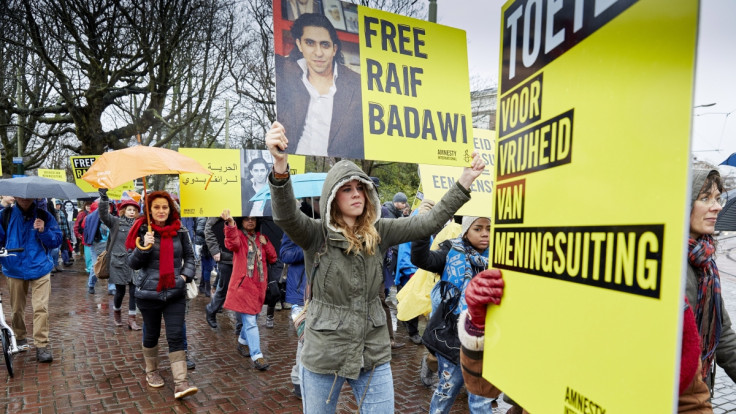Saudi Arabia buys Britain's silence on Raif Badawi and beheadings with arms deals and favours

It has been a year since the lashing of Raif Badawi and, despite an increased awareness of the brutality taking place, the situation for the Saudi people is no better. There was a significant increase in the number of executions in 2015, with one report from Amnesty International suggesting the beheading rate doubled.
At the same time, Saudi aggression has extended beyond its own borders, with the bombardment of Yemen having killed more than 5,000 people and destroyed vital infrastructure. Reports from Amnesty International and Human Rights Watch have accused the Saudi air force of violating international humanitarian law, but the response of the world powers has rarely extended beyond rhetoric.
The Saudi authorities began 2016 with a mass execution that sent out the message there will be no change this year. Some 47 people were killed in terrible scenes that led to even greater tensions in the region and a breakdown of diplomatic relations between Saudi Arabia and Iran.
Over recent months we have seen serious allegations that the UK lobbied behind the scenes to secure Saudi Arabia's election to the UN Human Rights Council; a membership which would be laughable if it wasn't so serious
The only country that has talked about reviewing the way it does business with the Saudis is Germany. Earlier this week Sigmar Gabriel, the economy minister, said that in light of the humanitarian situation Germany will review its arms sales to the kingdom. This followed the unexpected decision of German intelligence services to go on the record in accusing the Saudi authorities of "destabilising" the Arab World' in December.
In comparison the UK has been at pains to stress that nothing has changed in its relationship. Foreign Secretary Philip Hammond went to Saudi in November as part of a delegation that was sent to smooth relations since the short-term fallout over the cancellation of the UK prison contract with Saudi authorities. It was "business as usual" he said. "You do not get an audience with the king of Saudi Arabians if the Saudi Arabians are cross with you. The fact that I was received the way I was sends a very powerful signal."
Of course the issue of UK support extends way beyond this particular Conservative government. Over the past 40 years UK governments of all colours have built a uniquely close military relationship with the Saudis.
One outcome of this has been the high level of integration of UK and Saudi military programmes. Around 240 UK Ministry of Defence civil servants and military personnel work to support military contracts through the Ministry of Defence Saudi Armed Forces Programme and the Saudi Arabia National Guard Communications Project.
The last time there was any real scrutiny of UK arms sales to Saudi was in 2004, when the Serious Fraud Office began looking into corruption relating to arms sales to the regime. The investigation threatened to unearth a plethora of embarrassing details, but, after a concerted lobbying effort, including interventions by then prime minister Tony Blair and the attorney general, it was dropped. Shortly after, a deal was signed to sell billions of pounds worth of fighter jets to the regime.
This pattern of trading political favours and arms deals has only continued.
Over recent months we have seen serious allegations that the UK lobbied behind the scenes to secure Saudi Arabia's election to the UN Human Rights Council; a membership which would be laughable if it wasn't so serious. Furthermore, it is perhaps no surprise that Saudi was the only major death penalty state to be omitted from the UK's anti-death penalty strategy.
There are clearly a lot of vested interests and members of the UK and Saudi establishment who have too much to lose from an end to business as usual. That is one of the reasons why Campaign Against Arms Trade (CAAT) and our lawyers at Leigh Day have announced that we are considering legal action against the government for its role in the bombing of Yemen.
The arms sales and fawning political support of governments like the UK are empowering the regime and making the chances of long-term peace in the region even more remote. Saudi isn't just buying weapons, it's also buying political support. The result isn't just that the UK is ignoring the abuses taking place, it is also helping to facilitate them.
As the destruction of Yemen continues, and as thousands like Raif Badawi languish in prison for protesting against their government, the question we need to ask is how many more will be tortured and killed before government's like the UK finally say that enough is enough?
Andrew Smith is a spokesperson for Campaign Against Arms Trade (CAAT). You can follow CAAT on Twitter at @CAATuk.
© Copyright IBTimes 2025. All rights reserved.






















